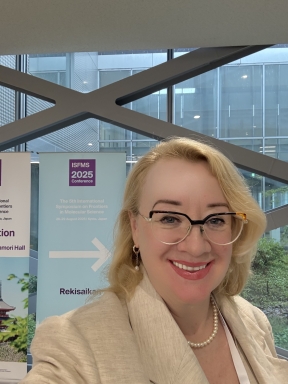Short Bio:
Dr. Alisa Sokolovskaya, Department of Molecular and Cellular Pathophysiology, Institute of General Pathology and Pathophysiology, Baltiyskaya str., 8. 125315, Moscow, Russia. Email: alice.sokolovskaya@gmail.com, Phone: +7-903-162-05-26, ORCID 0000-0002-0112-2734
Education: Master's degree in biology and chemistry, A.S. Pushkin state pedagogical Institute, Tbilisi, Georgia, 1986; Ph.D. degree, Oncology, Cancer Research Center, Moscow, Russia, 2002.
Her research spans several critical areas: the molecular and cellular mechanisms of stress response and apoptosis, space biotechnology, and space medicine. She investigates how simulated microgravity affects human cells in culture and explores the molecular and cellular pathways by which cellular stress influences both normal and tumor cells under altered gravity conditions. Her work also includes cancer research, focusing on drug-induced apoptosis in experimental oncology and the role of heat shock proteins in cancer stem cells.
During her career, she collaborated with Prof. John Eriksson at the University of Turku, Finland, to understand the mechanisms of drug resistance in cancer cells. From 2004-2006 she was a postdoctoral fellow with Professor Noriyuki Sato in Sapporo, Japan. She investigated the molecular mechanisms of apoptosis signal regulation by stress proteins. This involved analyzing a novel HSP-40 protein, DNAJB8.
She has shared her findings at numerous scientific gatherings, including international astronautical conferences and Japanese cancer symposia. Additionally, she is a member of the International Astronautical Federation and has authored more than 70 peer-reviewed papers. She mentors six undergraduate students and four graduate students, two of whom have successfully defended their doctoral dissertations.
She is a member of MDPI's Review Board. During the period from 2020 to 2025, and have reviewed a total of 28 manuscripts across several journals. These journals include Endocrinology, Biology, IJMS, Onco and Medicina, Cells, Aerospace and Molecules, Applied Biosciences and Life, Invention, Biomolecules, and Biomedicines. in the period from 2020 to 2025.
|
